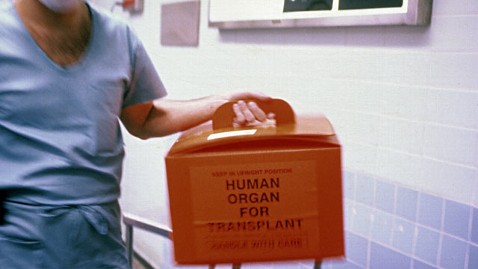More Than One Sexual Partner? You May Be an ‘Elevated Risk’ Donor

New guidelines proposed that would label organ donors who have had more than one sexual partner in the last 12 months as risky are for the benefit of patients receiving the organs and would not halt or ban donations, a Centers for Disease Control and Prevention official said today.
The proposed guidelines, however, remained controversial in the transplant community.
"What we are trying to do is make sure patients are informed about the risks the organ might have so they can make the best decision about whether the transplant is right for them," Dr. Matthew J. Kuehnert, director of the CDC's office of Blood, Organ and Other Tissue Safety told ABCNews.com.
Under the new guidelines, which have not been adopted and are in the public comments stage, living and deceased donors who had more than one sexual partner in the past 12 months would be considered "elevated risk" donors because of the increased likelihood they could have HIV, hepatitis B and hepatitis C, even if they did not show any risk factors.
Organ transplant doctors said they are concerned the proposed guidelines will lead to more deaths of the 112,000 people who are currently on the transplant waiting list because they will eat up valuable time and money conducting tests on organs for HIV, and Hepatitis A and C, even though the tests aren't 100 percent accurate.
"If you game the system to prevent any possible transmission of an infectious disease, you will simply wind up with an increase of deaths," said Dr. David Cronin, who is an associate professor of surgery at the Medical College of Wisconsin and director of liver transplantation at Froedtert Hospital.
The American Society of Transplant Surgeons agreed with Cronin and issued a letter criticizing the new guidelines, decrying the lack of a collaborative process behind the scenes, which caused several of its members to withdraw from an advisory panel.
"[The guidelines have] a real potential to mislead the public regarding the risks of disease transmission through solid organ transplantation," said the letter, which was directed to CDC Director Thomas Frieden. "These guidelines, if finalized in their current form, are likely to have significant consequences for the transplant community."
Kuehnert said he "would be concerned about any factor that would deter a donor," but added that there is education that needs to be done for donors and recipients. If implemented, these guidelines would be just that - markers to guide the transplant process, and they wouldn't be policy, he said.
"These are recommendations by the public health service. They are not regulations. The extra step would be if the regulators would translate this into policy," Kuehner said.
He stressed that certain medical information from donors would be kept anonymous from recipients of their gifts.
"There is no exclusion of organs in any case, unless the organ tests positive for HIV," which is a federal law, he said.
As of now, there are no specifics regarding how donors would be questioned about their sexual histories, Kuehner said, but it's an area that Cronin finds deeply concerning.
"This is an extremely emotionally trying time," he said. "Someone's family member has died and now they're expected to answer, or even know, about their loved one's sexual history? People don't usually advertise these behaviors."
Beyond that, grieving family members and living donors may second-guess their decisions to donate, which is something Cronin does not want to see happen.
"My suspicion is people will say 'These are invasive and intrusive. To hell with it! I won't be an organ donor.'"
More than 28,000 organ transplants take place each year, according to data from the Organ Procurement and Transplantation Network.
The public comment period regarding the proposed guidelines ends Dec. 23.